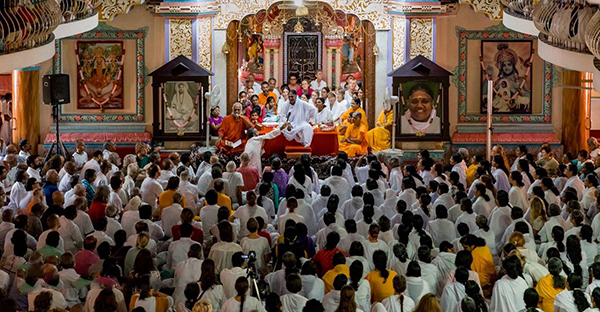| Qualities of a Disciple |

|
Question: Swamiji, what are the qualities of a good disciple?
|



|
Answer: Before examining the qualities of a good disciple, we need to first discuss the differences between being a devotee and a disciple.
Both devotees and disciples are people who truly love Amma. It is impossible to say whose love is greater. However, there is a difference between these two states: a disciple is willing to be disciplined while maintaining the attitude of surrender.
It is this surrender that allows them to be disciplined at the hands of the guru.
Amma says that only when the stone surrenders to the sculptor can the artist chisel away all the unwanted parts to make it into a beautiful statue. The guru’s molding of a disciple is similar.
The guru removes our negative tendencies, our vasanas. Because human beings are already the embodiment of the supreme consciousness, the guru does not suddenly make us more holy when she removes our negativities.
The guru removes our negativities to reveal our true identity. The individual self (Jivatma) is like water within a bubble floating in the ocean.
The guru pops the bubble of the ego, allowing us to become one with the ocean, experiencing our true nature which is the Supreme Consciousness.
It is because of the ego that we feel separated from the supreme consciousness. Therefore the guru eliminates both the ego and our vasanas.
This elimination process is the only thing the guru needs to do, as our true nature is always present, but is simply hidden from us. Despite this, however, the elimination process is very painful.
Losing the ego and our vasanas is a process that disciples resist, leading to a struggle between the guru and the disciple.
When this process starts—because it is very painful—the disciple tries to run away. The disciple gives many excuses for why he/she is not fit for the spiritual path, often saying that the spiritual path is not meant for him/her.
But the guru binds the disciple with love so that the disciple does not run away. And that is what Amma does to all of us – She binds all of us with Her love, attracting all of us to Her.
A disciple’s spiritual efforts start only after this bond is created.
Then, even when disciples try to run away from the guru, because of the pain caused by spiritual growth, they cannot as the disciple still feels the strong connection to Amma.
However, throughout this process, we often try to tell the guru to do things differently, saying: “this is not how you should do it, this is how you should remove the vasanas,” etc.
I remember in Amritapuri during one of the darshan days, Amma was talking to a Brahmachari. The Brahmachari whispered something in Amma’s ear about his negative tendency.
Amma started laughing and told all the people sitting around Her (there were about 500 people) that “this fellow has this problem, this weakness.”
The Brahmachari got so upset and asked Amma to explain why She had broadcasted his negativities to everyone what had he told Her in private.
He said that he felt ashamed. Amma then said “You don’t have to teach me my job. I am here to remove your vasanas and your ego and this is the way I will do it.
If you do not want me to do this, then you better go somewhere else.”
The guru is constantly chiseling away the negativities of a spiritual seeker. The surrender that a disciple maintains during this process is what creates the difference between a devotee and a disciple.
Having complete surrender to the guru is the primary manner in which you can become a better disciple.
The process of surrender is difficult: having complete surrender is a state only experienced by those who are realized.
To have complete surrender is to have complete faith in the guru. Initially—though the disciple might be able to surrender partially—they might struggle to have complete faith.
As a result, the disciple will doubt the guru, questioning them in their decisions or statements. A disciple might even wonder or doubt whether Amma is their right guru or not.
When the disciple matures, she/he realizes whatever the guru is doing is for the highest good and love.
Just as a surgeon removes a tumor in the body that affects our health, the guru removes negativity that causes distress and tension to the mind, which is an impediment to our spiritual journey.
When a disciple matures fully, she or he asks nothing of the guru, not even realization. Then the disciple has completely surrendered.
At this point, the disciple has only pure love for the guru, expecting nothing in return. A true disciple, at the moment of surrender, asks for nothing but to serve the guru wholeheartedly with pure love.
|









